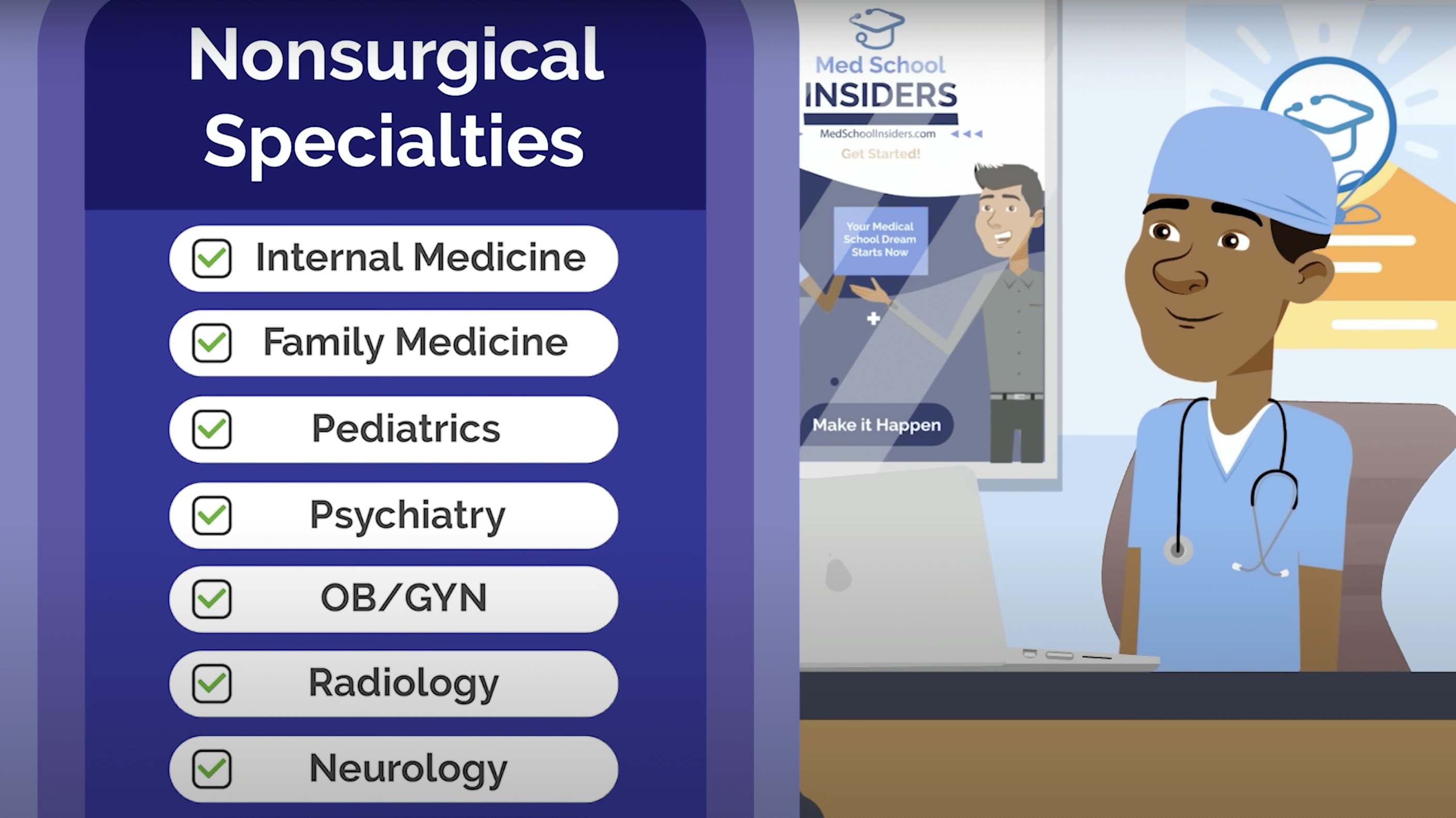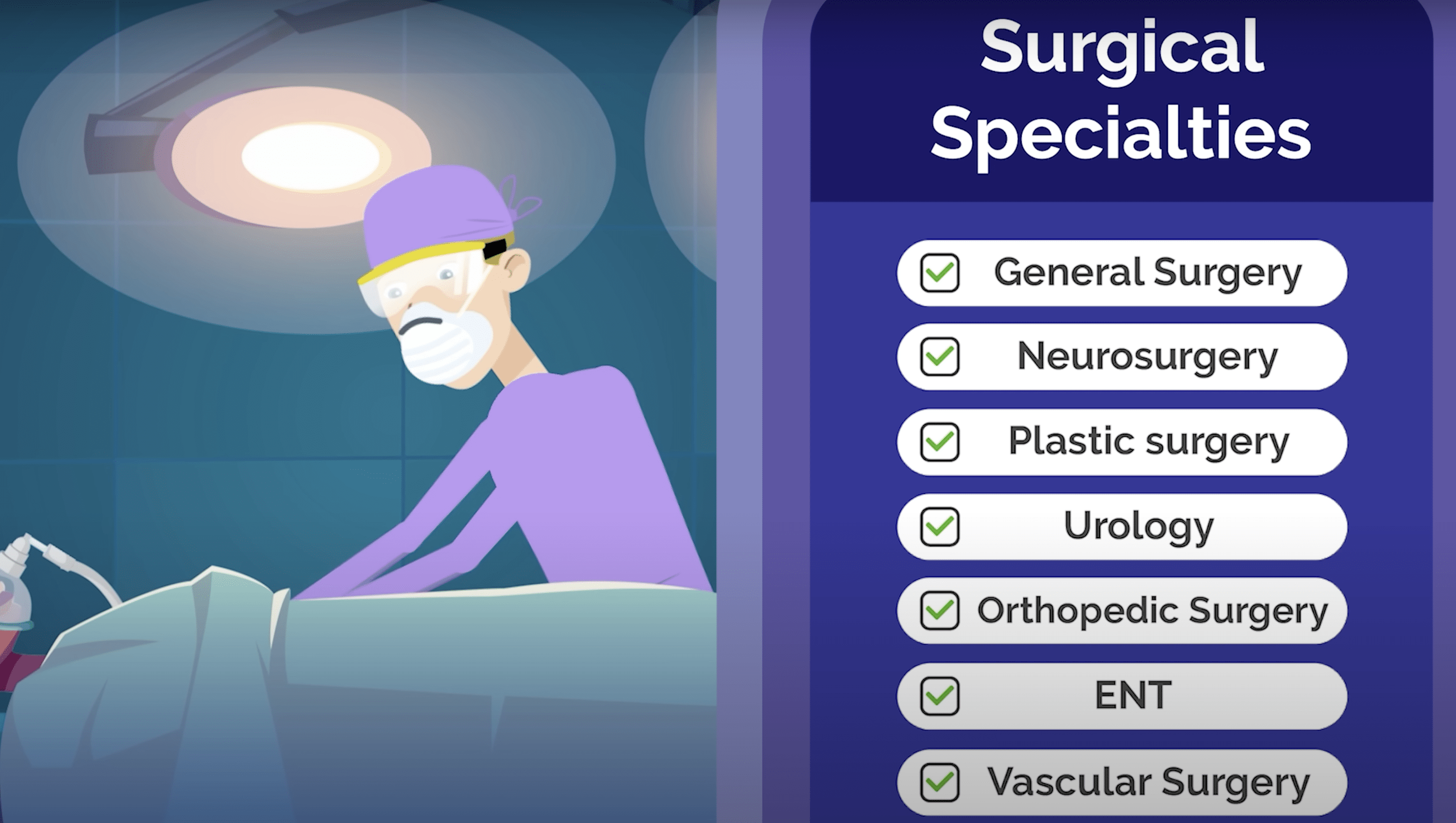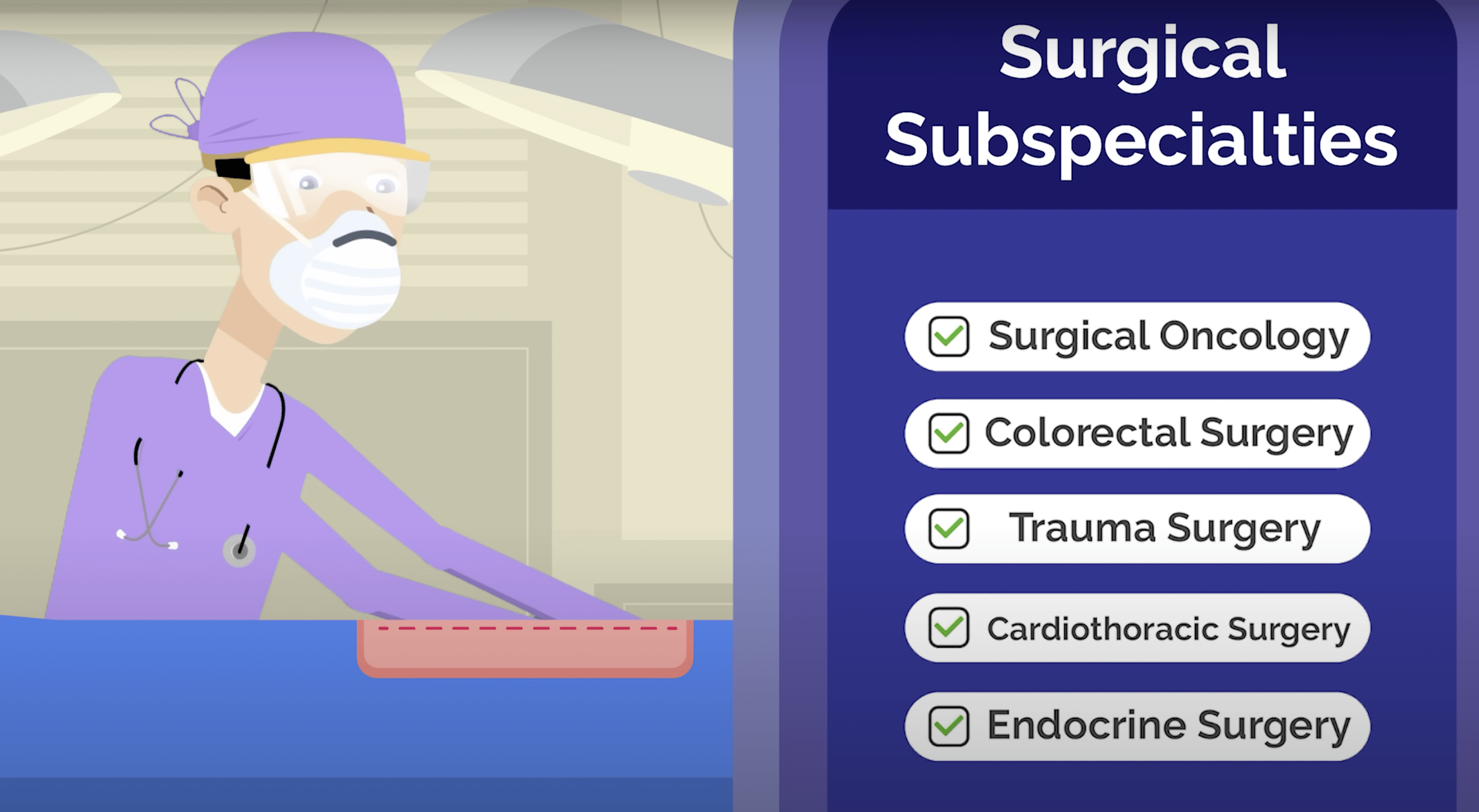
Highest-Paid Doctors by Hourly Rate in 2026
Neurosurgeons make $750,000 a year, the highest average salary in medicine. But after accounting for the number of hours worked per week, do they still come out on top?

Welcome to our brand new Career Battles series, where we’ll compare two different medical career options to help you decide which is the best path for you. We’ll break down compensation, lifestyle, length of training, and the pros and cons of pursuing each career path.
First up in our Career Battle arena is doctor vs surgeon.

Let’s clear something up before we get started: All surgeons are doctors but not every doctor is a surgeon.
Surgical fields include plastic surgery, vascular surgery, and orthopedic surgery, whereas nonsurgical fields include family medicine, psychiatry, and pediatrics.
Of course, the terminology around doctors is already confusing, as the term “doctor” can have different meanings in society. For example, if you earn a PhD in any subject from literature to paleontology, you are also called a doctor.
Some medical school admissions consultants mislead unsuspecting premeds by calling themselves “doctors”. While this is technically true because they have a PhD in clinical psychology, they have no medical training, are not physicians, and never went through the process of getting into medical school themselves, yet they claim to be experts on it.
For this video, when we speak about a doctor, we mean a physician, as in someone who has an MD or a DO.
In the US, you can become a physician by completing 4 years of medical school. This typically involves 2 years of preclinical training, which is primarily but not exclusively spent in the classroom, followed by 2 years of clinical training, which is primarily spent on rotations in the hospital or clinic.
While you’ll become a doctor with an MD or DO the day you graduate from medical school, you’re not a fully trained and board-certified physician until you complete residency and pass your board exams. Residency lasts 3 to 7 years after medical school. During residency, physicians train for a specific medical specialty. It’s this fork-in-the-road decision about your specialty that distinguishes a doctor from a surgeon.
Nonsurgical specialties include internal medicine, family medicine, pediatrics, psychiatry, OB/GYN, radiology, neurology, emergency medicine, dermatology, anesthesiology, PM&R, and pathology.

Surgical specialties include general surgery, neurosurgery, plastic surgery, urology, orthopedic surgery, otorhinolaryngology, or ENT, and vascular surgery.

You may be wondering: What about cardiology or gastroenterology? These are two of the many subspecializations of internal medicine, meaning before you can become a cardiologist or gastroenterologist, you must first complete 3 years of internal medicine residency followed by a cardiology or gastroenterology fellowship.
This is also true of many surgical subspecilizations. Before you can become a colorectal surgeon, you must complete 5 years of general surgery residency followed by a colorectal surgery fellowship.
Other surgical subspecializations after general surgery residency include minimally invasive surgery, thoracic surgery, pediatric surgery, and surgical oncology.

Internal medicine is to nonsurgical specialties as general surgery is to surgical specialties. Both are broad and allow for the widest breadth of specializations after your initial residency training.
For a detailed breakdown of each individual physician path, check out our So You Want to Be playlist, which takes a deep dive into over 50 medical specialties.
So, how is training different between surgical and nonsurgical specialties?
Residency length varies depending on the specialty you choose. In general, surgical specialties require more years of training.
The fastest way to become a doctor is to go straight from college to medical school without taking any breaks, spend 4 years in medical school without taking a gap year, and then match directly into a short, 3-year residency like family medicine, internal medicine, or pediatrics.
If you want to become a doctor in the shortest amount of time, check out our video outlining the fastest path to becoming a doctor, linked in the description.
To become a surgeon, you must initially follow the same steps as someone who wants to pursue a nonsurgical specialty by completing 4 years of medical school.
However, when it comes time to apply for residency, you will apply to a surgical specialty.
Some surgical specialties have their own dedicated residency following medical school, whereas others require a 5-year general surgery residency first before further subspecialization.
After general surgery, there are many surgical paths to further subspecialize depending on your interests, such as surgical oncology, colorectal surgery, trauma surgery, cardiothoracic surgery, and endocrine surgery, to name a few. We cover all surgical specialties and subspecialties in another video linked in the description.
Fellowships last anywhere from 1 to 3 years, depending on the subspecialization you are pursuing.
For example, let’s consider plastic surgery. You can either match directly into a 6-year plastic surgery residency, which is known as the integrated path, or you may take the independent path, which requires 5 years of general surgery residency before applying for an additional 3 years of independent plastic surgery training.
If you like the idea of matching directly into plastic surgery residency, keep in mind that plastic surgery consistently ranks in the top three most competitive specialties to match into.

Download our complete Specialty Competitiveness Index.
So, is it easier to become a doctor or a surgeon? That all depends on your interests and whether or not you’re dextrous and enjoy working with your hands. While surgical specialties tend to require more training, this is not always the case. Radiology, for example, is a 5-year residency; if you’re interested in interventional radiology, residency can last 6 to 7 years. This means training to become an interventional radiologist takes longer than becoming a general surgeon. But keep in mind, surgical residencies tend to require more grueling hours and compromises to one’s lifestyle compared to non-surgical residencies.
Plus, some specialties are easier to enter than others.
Generally speaking, surgical specialties are more competitive, with 4 surgical specialties in the top 5 most competitive, the exception being dermatology. All of the least competitive specialties are nonsurgical.

Next, how does the compensation compare between surgical and nonsurgical career paths?
Since the title of “doctor” is so broad, there’s actually quite a range in compensation.
The lowest-paid nonsurgical specialty is pediatric endocrinology at $217,875. In fact, most pediatric subspecialties make considerably less than adult specialties because children are more resilient than adults and require fewer procedures. The lowest-paid non-pediatric specialty is medical genetics and genomics at $244,517. The highest-paid nonsurgical specialty is radiation oncology at $569,170.
Comparatively, the lowest-paid surgical specialty is colorectal surgery at $455,282, and the highest-paid surgical specialty is neurosurgery at $763,908.
The difference between the lowest-paid nonsurgical specialty and the highest-paid surgical specialty is nearly $550,000, while the difference between the lowest-paid surgical specialty and the highest is just over $300,000.
As you can see, surgeons tend to make more money than nonsurgical physicians. In fact, the five highest-paying medical specialties are all surgical specialties—oral and maxillofacial surgery, plastic surgery, orthopedic surgery, thoracic surgery, and neurosurgery.
Because there are so many different surgical and nonsurgical paths, we’ll need to make some generalizations here.
Typically, nonsurgical medical careers are less demanding and offer a better work-life balance. Nonsurgical specialists usually work fewer hours and are less likely to be on call.
Dermatologists, for example, work about 40 to 50 hours a week, whereas neurosurgeons can work upwards of 70 hours per week.
Surgical physicians tend to work longer, more stressful hours and are more commonly on call. This means they can be called in to perform emergency surgery at a moment’s notice, including nights and weekends. But this is only when they’re on call. If a doctor has Christmas off, that time is still protected. Surgical procedures are also mentally and physically taxing, with some complex surgeries lasting over 10 hours.
Next, what are the pros and cons of becoming a doctor?
As a pro, nonsurgical specialties tend to have a more reasonable work-life balance. Again, this is in general, and there are exceptions.
Nearly all nonsurgical specialties require fewer years of training and are often less competitive for residency programs. For example, of the 22 specialties listed in our competitiveness index, the bottom half are all nonsurgical.
Fewer years of residency also means you’ll be able to start earning a 6-figure salary sooner, which means you can begin to pay off any medical school debt, which currently averages over $250,000 by the end of medical school.
This brings us to a notable con.
The trade-off of better work-life balance and fewer years of training is that most nonsurgical physicians make less money than surgeons. The exceptions are radiation oncology, cardiology, and radiology, which are the only nonsurgical specialties that rank in the top 10 highest-paid doctors.
Another con is that the work may not be fast-paced enough, especially for those who want to work with their hands. For those who enjoy procedures, nonsurgical specialties won’t be nearly as technically stimulating or challenging as a surgical career.
However, many nonsurgical specialties tend to be more intellectually engaging. For example, neurology, psychiatry, and allergy/immunology, where diagnoses and treatments are not always clear cut, and it’s up to the physician to solve the puzzle. Consider the show House; while exaggerated and dramatized, Dr. House is an internal medicine hospitalist who solves unique and complex cases.
Now let’s consider the pros and cons of becoming a surgeon.
A notable pro is the higher pay, with the lowest-paid surgical subspecialty, colorectal surgery, still making over $455,000 a year. Depending on your specialty and whether or not you further specialize as a surgeon, you can make over $700,000 as a thoracic surgeon or neurosurgeon.
But beyond the money, it comes down to your personal preference and interest in medicine. If you’re meticulous, dextrous, thrive under pressure, and enjoy working with your hands, surgery is an ideal fit. You’ll be stimulated from a technical perspective, while other less procedure-focused specialties may leave you wanting more.
The most notable drawback of becoming a surgeon is the longer training that’s required. The shortest residency, such as general surgery, still requires 5 years of training after 4 years of medical school.
For higher-paying surgical specialties, like neurosurgery, residency lasts 7 years, and while you’ll be taking home a larger paycheck when you come out the other side, you won’t be making anywhere near 6 figures during residency. On average, a resident’s starting salary is around $60,000, and compensation only increases by a couple of thousand dollars per year the further you get into your training.
There’s also your lifestyle to consider. Most surgical career paths have longer, more demanding hours. But there are some exceptions like certain types of plastic surgery, ENT, and urology, which tend to have a more laidback lifestyle with fewer emergencies. However, during residency, which lasts at least 5 years, all surgical specialties have terrible hours.
Lastly, there’s more risk involved, as many surgeons have the life of a human being quite literally in their hands. Surgeons typically pay much more for liability insurance because of the higher risk of complications and increased potential for malpractice claims.

Bottom line, which career path is best for you?
The advice I heard when I was in medical school is that if you see yourself doing anything other than surgery, do that instead. And only opt for surgery if you can’t imagine doing anything else, as the costs to your lifestyle and personal life are substantial.
When choosing between a surgical and nonsurgical specialty, consider your strengths and weaknesses. If you enjoy procedures and want to work with your hands, the increased competitiveness and longer years of training may be worth it in the end.
While surgeons are typically paid more, money should not be a primary, secondary, or even tertiary deciding factor when choosing a medical specialty. Once you’re already making $300,000 a year, another $100,000 or $200,000 is not worth the trade-off of pursuing a career that doesn’t align with your interests and passions.
Many people focus far too much on compensation, competitiveness, and prestige rather than taking the time to find a medical career they’re truly passionate about. Our So You Want to Be series is designed to help you make educated career decisions.
What medical career paths would you like us to cover next? Psychiatry vs neurology, doctor vs nurse practitioner, or diagnostic vs interventional radiology? Let us know in the comments.

Neurosurgeons make $750,000 a year, the highest average salary in medicine. But after accounting for the number of hours worked per week, do they still come out on top?

Everything you need to know about going to medical school in Indiana—how to apply, tips for acceptance, and how to decide if Indiana is right for you.